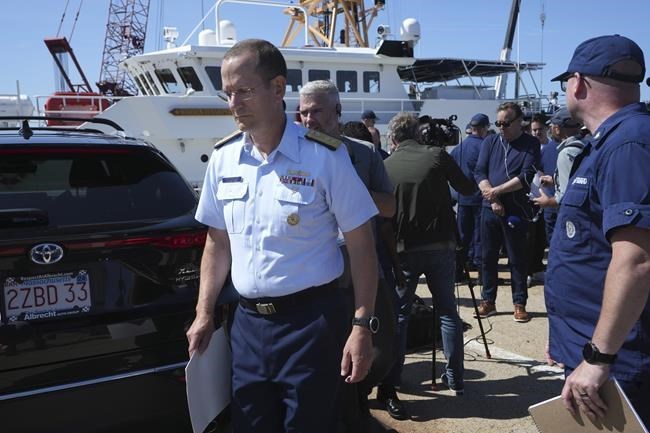The U.S. navy has confirmed its acoustic sensors detected on Sunday “an anomaly consistent with an implosion” in the area where the doomed submersible Titan was operating several hours before the vessel was reported missing.
In an email, a senior U.S. navy official said an analysis of the acoustic data was shared with the “unified command” leading the search for the vessel with five people aboard, the wreckage of which was discovered Thursday near the Titanic.
The U.S. navy has long maintained a network of listening devices on the floor of the North Atlantic to detect hostile submarines.
The navy official said the finding was not definitive, adding that the information was considered with acoustic data provided by other partners in the search, which was led by the U.S. Coast Guard.
The official said the decision was made to continue with the search-and-rescue mission and “make every effort to save the lives on board.”
But information about the anomaly wasn’t shared with the public until after the Titan’s wreckage was found and all five passengers were presumed dead.
The Canadian Armed Forces, which took part in the search, did not immediately respond to a request for comment about the U.S. navy's data.
Meanwhile, a Canadian military official confirmed Friday that the Canadian Coast Guard vessel John Cabot would be remaining in the search area to help with the recovery operation, though no details were released.
Some of the other Canadian ships and aircraft used during the search were sent back to their bases Friday, including coastal defence vessel HMCS Glace Bay and a CP-140 Aurora long-range patrol aircraft, based at CFB Greenwood in Nova Scotia.
"The U.S. coast guard no longer requires the rescue assets from our forces," said Lt.-Cmdr. Len Hickey, spokesman for Joint Rescue Co-ordination Centre in Halifax.
Earlier this week, the crew aboard an Aurora aircraft dropped sonar-equipped buoys into the ocean near the Titanic wreck site and picked up banging sounds, which led to frenzied speculation that those aboard the Titan could have been signalling for help.
On Thursday, the U.S. Coast Guard said those noises had no connection to the demise of the Titan, which was torn apart by a catastrophic implosion on Sunday as it was descending toward the Titanic as part of a commercial expedition.
This report by The Canadian Press was first published June 23, 2023.
The Canadian Press



